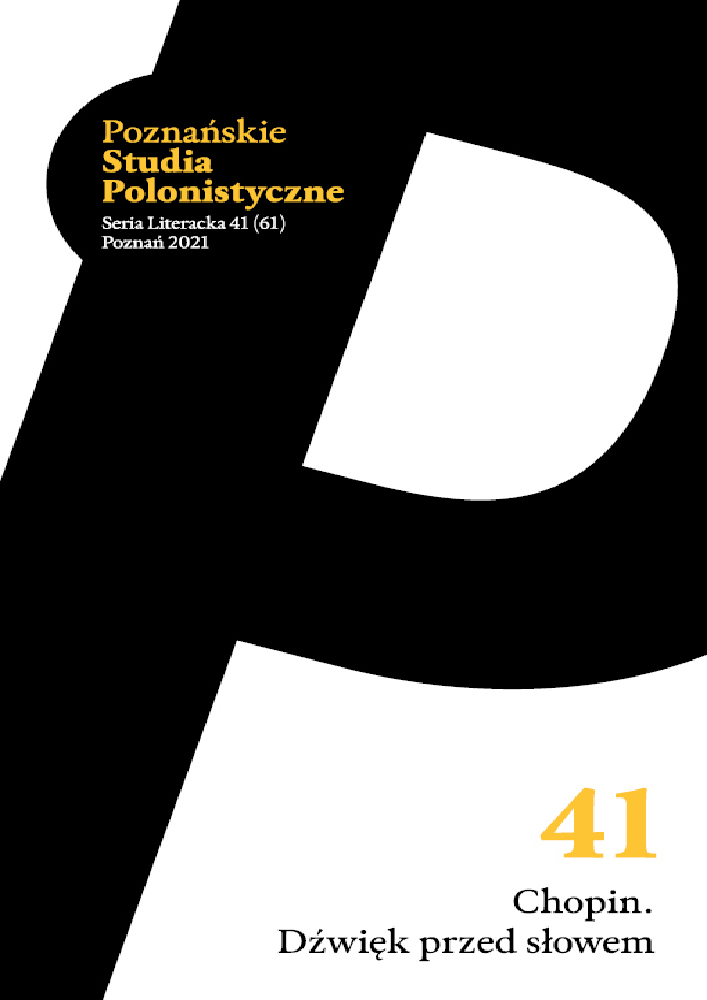Abstract
The reception of Chopin and his music in French literature follows the rhythm of the changes in the European intellectual and aesthetic climates. George Sand recorded in her memoirs the image of a romantic genius par excellence, a dark, torn and complicated soul. The decadent and symbolist poetry, best exemplified by Maurice Rollinat, presents a portrait of
a blood-spitting neurasthenic, a soulmate of the poet. Marcel Proust paints the image of an elegant dandy and exquisite artist, while the first part of the twentieth century is dominated by the neoromantic vision of Chopin as a great Polish patriot; this theme is perfectly illustrated by the poems of Anna de Noailles and Edmond Rostand. André Gide presents a radically
new view of Chopin’s music, seeing the Polish composer as a neoclassicist pianist. Contemporary literature and art go on to dress Chopin in jeans, eagerly turning him into a mass culture hero.
References
Baudelaire Charles (1994), Kwiaty zła, wybór Maria Leśniewska i Jerzy Brzozowski, posł. Jerzy Brzozowski, przeł. Zbigniew Bieńkowski i in., Wydawnictwo Literackie, Kraków.
Brunel Pierre (1989), „Lucrezia Floriani”, miroir de la liaison Chopin-Sand, „Revue de Musicologie”, t. 75/2, s. 147-156.
Dassin Joe (1975), Le costume blanc, CD, CBS Sony Corporation.
Domagalski Jerzy (1995), Proust w literaturze polskiej do 1945 roku, IBL, Warszawa, s. 142, [przedruk: „Zeszyty Literackie” 2010, nr 109, s. 23].
Eigeldinger Jean-Jacques (2000), L’univers musical de Chopin, Fayard, Paris.
Gauthier Marie-Véronique (2000), Chopin, la guerre et moi, Imago, Paris.
Gide André (2007), Notatki o Chopinie, przeł. Magdalena Musiał, Astraia, Kraków.
Heine Heinrich (1838), „Revue et Gazette Musicale de Paris”, 4 lutego, s. 53.
Kaempf Pierre-François (1995), Images de Chopin au début du siecle, w: La Fortune de Frédéric Chopin, red. Zbigniew Naliwajek, Hanna Wróblewska-Straus, Joanna Żurowska, Towarzystwo im. Fryderyka Chopina, Warszawa, s. 109-118.
Malinowski Wiesław Mateusz, Styczyński Jerzy (2016), Polska i Polacy w literaturze francuskiej (XIV-XIX w.), Wydawnictwo Naukowe UAM, Poznań.
Nectoux Jean-Michel (2005), Chopin ou le temps retrouvé, w: Frédéric Chopin. Interprétations, red. Jean-Jacques Eigeldinger, Droz, Geneve, s. 173-192.
Noailles Anna de (1913), La Musique de Chopin, w: tejże, Les Vivants et les Morts, Artheme Fayard et Cie, Paris, s. 69-70.
Noailles Anna de (1934), Derniers vers et Poemes d’enfance, Grasset, Paris.
Proust Marcel (1896), Chopin, w: tegoż, Les Plaisirs et les jours, C. Lévy, Paris, s. 135.
Proust Marcel (1974), W poszukiwaniu straconego czasu, t. 1: W stronę Swanna, przeł. Tadeusz Żeleński (Boy), PIW, Warszawa.
Rollinat Maurice (1883), Chopin, w: tegoż, Les Névroses. Les âmes, les luxures, les refuges, les spectres, les ténebres. Avec un portrait de l’auteur par F. Desmoulin, G. Charpentier, Paris, s. 53-55.
Rostand Edmond de (1919), Le Coeur de Chopin, w: tegoż, Le Vol de la Marseillaise, E. Fasquelle, Paris, s. 171-179.
Sand George (1873), Impressions et Souvenirs, Freres Michel Lévy, Paris.
Sand George (2004), Histoire de ma vie, Gallimard, Paris.
Sand George (1968a), Correspondance, t. IV, red. Georges Lubin, Garnier, Paris.
Sand George (1968b), Dzieje mojego życia, przeł. Maria Dramińska-Joczowa, wstęp Maria Straszewska, wybór Stanisława Kożuchowska, PIW, Warszawa.
Sand George (2009), Lukrecja Floriani, przeł. Zofia Jędrzejowska-Waszczuk, NIFC, Warszawa.
Schmitt Éric-Emmanuel (2017), Mes maîtres de bonheur, Librairie Générale Francaise, Paris.
Schmitt Éric-Emmanuel (2018), Madame Pylinska et le secret de Chopin, Albin Michel, Paris.
Schmitt Éric-Emmanuel (2019), Madame Pylinska i sekret Chopina, przeł. Łukasz Müller, Znak, Kraków.
„Télérama. Hours Série” (2010), nr 1: 2010. Année Chopin.
Tharaud Alexandre (2010), Chopin. Journal intime, CD, Emi Classics.
Tout sur un plateau du 22/03/2017 Deuxieme Partie (2017), [dostęp: 15 stycznia 2021], https://tinyurl.com/5esw2bkc.
Żurowska Joanna (1995), Proust et Chopin, w: La Fortune de Frédéric Chopin, red. Zbigniew Naliwajek, Hanna Wróblewska-Straus, Joanna Żurowska, Towarzystwo im. Fryderyka Chopina, Warszawa, s. 61-71.
License
Authors
Authors of texts accepted for publication in „Poznańskie Studia Polonistyczne. Seria Literacka” are required to complete, sign and return to the editor's office the Agreement for granting a royalty-free license to works with a commitment to grant a CC sub-license.
Under the agreement, the authors of texts published in „Poznańskie Studia Polonistyczne. Seria Literacka” grant the Adam Mickiewicz University in Poznań a non-exclusive, royalty-free license and authorize the use of Attribution-NoDerivatives 4.0 International (CC BY-ND 4.0)Creative Commons sub-license.
The authors retain the right to continue the free disposal of the work.
Users
Interested Internet users are entitled to use works published in „Poznańskie Studia Polonistyczne. Seria Literacka” since 2016, for non-commercial purposes only, under the following conditions:
- attribution - obligation to provide, together with the distributed work, information about the authorship, title, source (link to the original work, DOI) and the license itself.
- no derivatives - the work must be preserved in its original form, without the author's consent it is not possible to distribute the modified work, such as translations, publications, etc.
Copyrights are reserved for all texts published before 2016.
Miscellaneous
Adam Mickiewicz University in Poznań retains the right to magazines as a whole (layout, graphic form, title, cover design, logo etc.).
